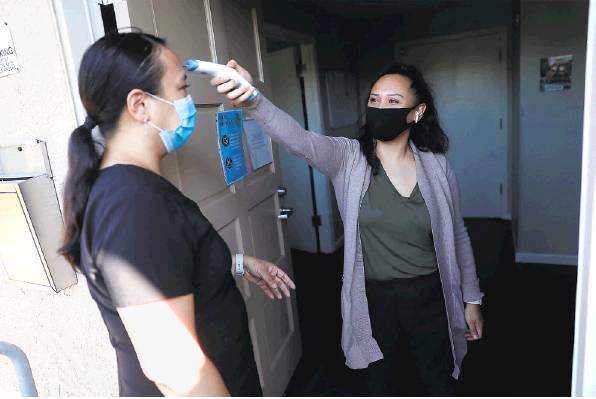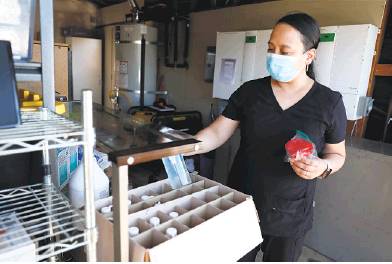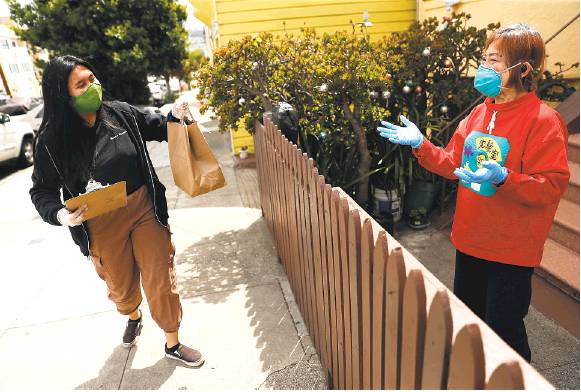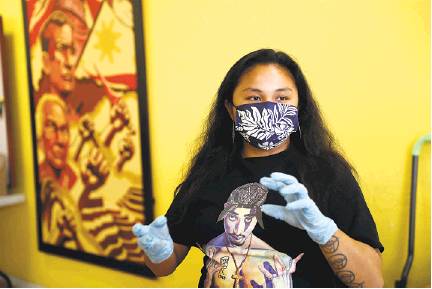Bay Area Filipinos at epicenter of care
Frontline workers, often hidden, make personal sacrifices to keep clients safe
By Mallory MoenchRosalie Amacan is holding down three health care jobs in the midst of a pandemic.
On the weekends, she dons a lab coat managing other nurses on a unit treating COVID-19 patients at Kaiser in San Leandro. On weekdays, she cares for a child with special needs in a private home in Hayward. She also runs a care home for the developmentally disabled on a quiet Fremont street.
It may sound like a heavy workload. But it’s not uncommon among the Bay Area’s Filipino Americans, a community of more than 400,000 that provides a disproportionately high percentage of health care workers standing at the epicenter of the region’s coronavirus pandemic.
Across the Bay Area, 17% of nurses are Filipino, according to the most recent California Board of Registered Nursing survey, compared with 5% of the total population. In San Francisco, nearly a quarter of workers at city-owned hospitals, clinics and nursing homes are Filipino, although only 4% of city residents are Filipinos. The Bay Area is home to one of the largest Filipino communities in the U.S.
“Filipinos are right there on the front lines — part of the front lines that is hidden,” said Katrina Liwanag, immigration services program coordinator at the Filipino Community Center in San Francisco’s Excelsior neighborhood. During the pandemic, the storefront center is making calls to check in and provide services to more than 300 community members. That includes 67 caregivers who work in private residences and nursing homes.
“It’s nerve-racking,” she said. “They’re all working under similar conditions and are afraid of spreading it.”
Whether Filipinos have been hit harder by the virus is hard to discern because their data are included with all Asian Americans, a group that has suffered the highest death toll by far in San Francisco. But it’s clear that a high number of Filipinos are caring for the sick, trying to keep themselves safe, and supporting families at the same time.
For part of the pandemic, Amacan stayed in a hotel after her overnight shift at Kaiser to protect her family. Now she comes straight home, but first wipes her feet off on a disinfecting mat in the garage, stashes her scrubs in a plastic bin, and showers before her four children wake up.
Amacan’s sister is also a nurse, and her father rents rooms to caregivers. To avoid infection, she hasn’t seen either of them since shelter-inplace orders went into effect.
“It’s impacting a lot of people,” said Amacan, whose parents emigrated from the Philippines to the U.S. “Filipinos are all over.”
All 20 staff members Amacan employs at her care home are Filipino. Some work in multiple facilities and live with family members who are also health care workers.
Amacan is vigilant about making sure her employees don’t come to work sick, screening them for symptoms at the door. Visitors are banned. She stocks the home’s garage with boxes of hand sanitizer, plastic bags of hair nets, and a giant jug of alcohol for making sanitizer.
The care home went on alert in March when one of the workers reported a high temperature at the end of the workday. He went straight to the emergency room and the next day tested negative for the coronavirus. The care home reported the incident to public health officials and tested all residents and staff.
“We’re concerned because we take care of people who are really vulnerable,” said Monsieur Martinez, the worker who had a high fever. “As much as we don’t want to expose them, we also have to take care of them because nobody will.”
Allyssa Vergara, supervising nurse at the care home, knows many Filipino friends caring for COVID-19 patients: She hasn’t seem them for months to protect both of their families.
“I’m trying to be there for them in a way without them feeling isolated,” she said. “It’s tiring. It’s lonely. It’s draining. You have to be so cautious about everyone else.”
Amacan and other community advocates said the Filipino health care workers most at risk during the pandemic are those working under the table in lessregulated care homes and private residences who were already vulnerable to labor abuses.
Amacan’s husband, San Amacan, said he won back wages from another care home where he worked 60 hours a week without overtime pay or meal breaks. He is documented now, but at the time, he was a new immigrant who had overstayed his visa and didn’t know how labor laws worked.
One in 4 Bay Area Filipino caregivers is undocumented, according to a study by Valerie Francisco-Menchavez, associate professor in the Department of Sociology and Sexuality Studies at San Francisco State University.
“COVID-19 worsens the crisis of care under which caregivers are super-exploited,” Francisco-Menchavez said. “Everything that was happening pre-pandemic, it’s happening postpandemic, but worse.”
Now these health care workers are worried about the availability of personal protective equipment and infecting people they live with, said Tess Brillante, a former caregiver and wage theft victim in San Jose who now works for Santa Clara County. Undocumented workers already living in proximity, and in poverty, are at higher risk of infection, said Robyn Rodriguez, director for the Bulosan Center for Filipino Studies at UC Davis.
Undocumented caregivers who spoke with The Chronicle described living in houses with up to a dozen Filipino workers, making it nearly impossible to isolate when one of their housemates tested positive.
Some were too scared to continue working in nursing homes that were hotbeds of virus infection. But giving up work meant slashing income used to support family back home. These workers don’t qualify for federal stimulus funds and said they haven’t been able to access state aid for the undocumented, so turn to community organizations and rally other caregivers for support.
During the pandemic, Bay Area Filipinos said they’re driven by strong cultural values of interdependence — what they call a bayanihan response — to support the vulnerable.
“Bayanihan is the coming together of everyone to be able to achieve something,” said Luisa Antonio, the executive director of the Bayanihan Equity Center, inside the brightly colored building that originally served Filipino World War II veterans in San Francisco’s South of Market neighborhood.
About 330 of the center’s clients are elderly Filipinos served by a government-employed caregiver who is almost always Filipino, as well, to understand their language and culture, Antonio said. Now those elderly clients are sheltering in place, some in single-room-occupancy hotels.
The community center started conducting wellness checks via phone so clients wouldn’t fall through the cracks. The center, which formerly served 150 clients with a weekly food pantry, now helps 300. The center also reached out to other organizations including the Filipino Community Center, which started a new food delivery program.
On a recent busy Thursday — food delivery day — Antonio crouched on the floor organizing bags filled with sardines, rice, and kids’ snacks. The pandemic upended events at the center — no annual cultural festival, no birthday bingo, no inperson registering for the census — but the community is still supporting one another, she said.
Antonio pointed out that the first part of bayanihan is bayani, which also means hero.
“Frontline workers are heroes,” she said. “They are the army that is fighting this invisible enemy.”
Mallory Moench is a San Francisco Chronicle staff writer. Email: mallory.moench@sfchronicle.com Twitter:@mallorymoench
“COVID-19 worsens the crisis of care under which caregivers are super-exploited.”
Valerie Francisco-Menchavez, associate professor in the Department of Sociology and Sexuality Studies at San Francisco State University



